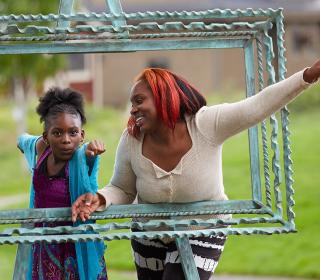What is Intersectionality?
People of color face challenges of accessibility, economic and educational opportunities, societal stigma, and gender bias. The term intersectionality, first coined by Kimberlé Crenshaw, is the overlap of social group categorizations that include; race, gender, and social class as it relates to systems of oppression. Intersectionality, as it relates to mental health, is important for us to understand and recognize the difference in experiences of people of color, specifically black people.
Intersectionality recognizes that people do not always belong to a single minority. For example, black women experience dual minority, while black female identifying immigrants experience a triple minority. The importance of recognizing these variables help improve racial disparities in treatment and recognize the unique experiences of black people.
One of last week's panelists, Dr. Knight, CEO-Founder of DSK Culturally Responsive Education Services, explained that "race-based trauma is a consequence of emotional pain that a person feels after encountering racism." And that racial trauma can be triggered by many events, but among the most common triggers are continued racial harassment, being a victim of police violence, or witnessing violence.

Social & Cultural Issues
The painful and well-documented history of government-sanctioned medical research experiments that knowingly exposed communities of color to health hazards contributes to the reluctance of some to seek care. Social issues faced by black communities include mass incarceration, gang violence, poverty, unemployment, and lack of resources. Mark Fadool, a psychiatrist at Odessa Brown Clinic, reminded us last week that, “all the ills we live with come from within.” This is especially true when talking about generational poverty and trauma. Marginalized communities are plagued with systemic issues that can create a constant feeling of hopelessness. According to a study, black men are particularly concerned about stigma and are reluctant to seek help from a mental health specialist.

Accessibility
While the Affordable Care Act closed the gap in uninsured, nearly 11.7 percent of black people do not have health insurance. Black people are also more likely to use emergency and/or primary care specialists. However, some of these professionals lack training in the diagnoses and treatment of mental and behavioral health for people of color. Funding to train more black psychologists would help to decrease stigma and encourage others to seek mental and behavioral health care when needed.
Today 14.8 percent of black people live in poverty. These individuals are at particular risk for mental health illness because of trauma related to homelessness, incarceration, children in foster care and child welfare systems, being victims of serious violent crime and domestic violence and intimate partner violence (IPV).

Black Women
According to a study by the Center on Poverty and Inequality at Georgetown Law, "‘black girls are perceived as more adult-like and less innocent than their white female peers, based on the belief that black girls are more independent, know more about adult topics, and need to be comforted and supported less than peers in their respective age groups." In some ways, black women are still invisible and live in environments in which they receive less support, which can negatively affect mental health. The cumulative effects of these stressors, combined with historical trauma, gender inequality, and racial prejudice contribute to anxiety, depression, and high-risk behaviors like substance abuse and IPV and domestic abuse.

LGBTQ+ Community
Members of the LGBTQ+-POC community are likely to experience discrimination resulting mental health problems. In addition, bisexual and trans people are more likely to be socioeconomically disadvantaged. Sexual minority individuals are at higher risk for mental health disorders, including depression, anxiety, substance abuse, and suicide. Such disparities are often linked to stressful experiences of stigma and discrimination that accompany a minority social identity.

What can we do?
In order to move to action and transformation, we want to evolve from a fixed mindset on pain and injustices to where we can begin to implement changes within our lives, our families, and our communities. We must re-examine accessibility, engagement, and support for all people of color towards better mental health. By supporting legislation, destigmatizing mental health discussions and providing affordable, accessible, relevant and culturally competent treatment, we can close the treatment gap. A diverse workforce, which includes people of color in leadership positions in the field of psychology, would help ensure that people and communities of color receive necessary healthcare.

Salma Siddick is the Social Media & Content Manager at YWCA Seattle | King | Snohomish. An immigrant from Zimbabwe, Salma has lived, worked, and attended school on three continents.
We share the stories of our program participants, programs, and staff, as well as news about the agency and what’s happening in our King and Snohomish community.

